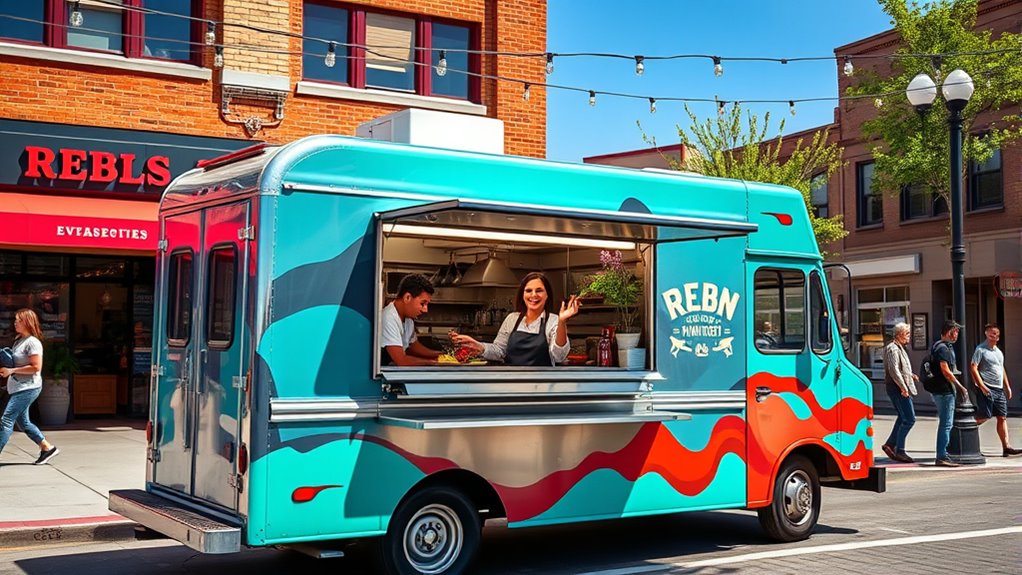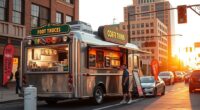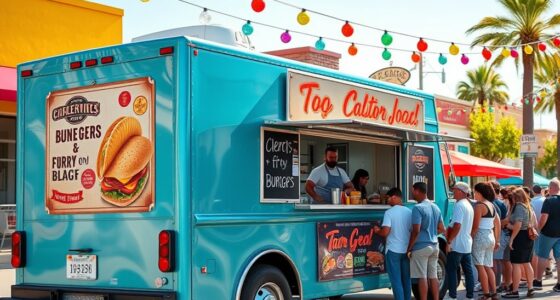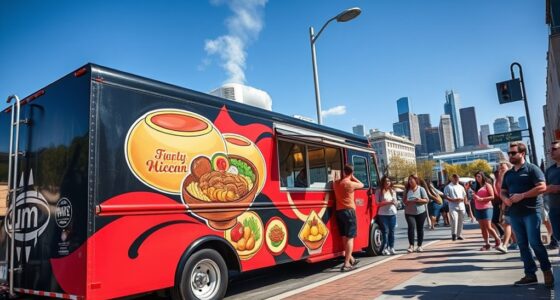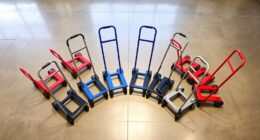To start a food truck in Boise, ID, you should source fresh local ingredients, understand city regulations, and apply for permits online. Set up your truck with the right equipment and secure a licensed shared kitchen if needed. Plan your menu with local flavors, price it competitively, and choose technology for smooth operations. Engaging with the community and food bloggers helps boost your visibility. Keep exploring to get the full scoop on launching your food truck successfully.
Key Takeaways
- Obtain necessary permits and licenses through Boise’s online portal, ensuring compliance with local zoning, parking, and health regulations.
- Source fresh, local ingredients from Boise-area farms to promote sustainability and enhance menu quality.
- Develop a detailed business plan, including startup costs, menu pricing, and financing options, tailored to Boise’s food scene.
- Choose a compliant, well-equipped shared kitchen space and customize your truck within budget to meet Idaho safety standards.
- Promote your food truck via social media, local events, and collaborations with Boise food bloggers to build visibility and customer base.
Fresh Local Ingredients Sourcing
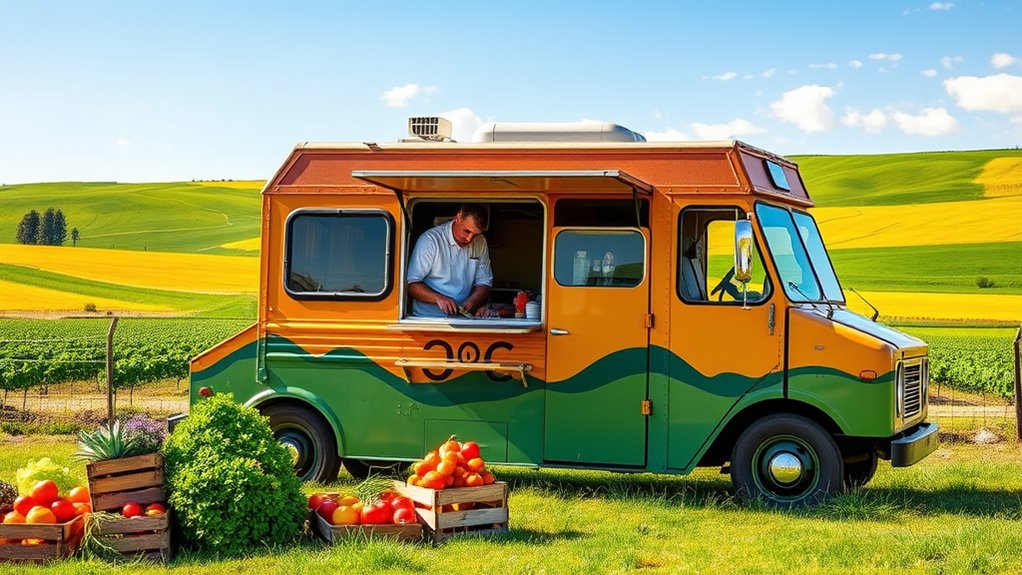
To guarantee the best flavors and support local farmers, the food truck in Boise sources its ingredients directly from nearby farms and markets. This farm to table sourcing ensures that you serve fresh, high-quality dishes made with seasonal ingredients. By working closely with local producers, you can select the ripest vegetables, herbs, and fruits at their peak, enhancing the taste and appearance of your menu items. Using seasonal ingredients not only improves flavor but also reduces your carbon footprint, promoting sustainability. This approach also builds strong relationships within the community, helping your business stand out. Embracing local sourcing means your customers enjoy authentic, fresh flavors while supporting the local economy—an essential step for a successful Boise food truck. Additionally, leveraging architectural solutions can help you design efficient and attractive mobile kitchens that optimize workflow and customer appeal.
Understanding Local Requirements
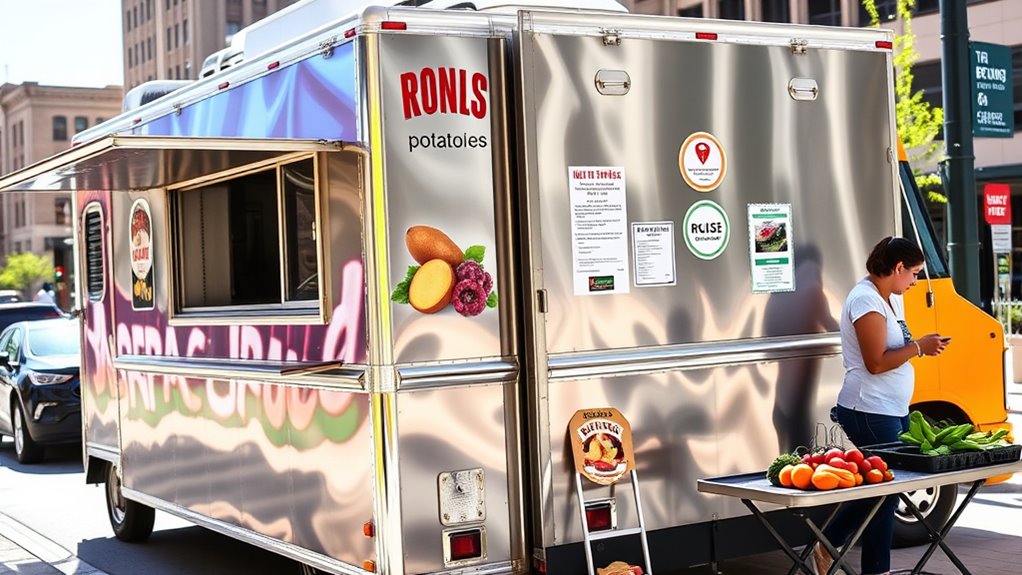
You need to complete the online permit application to operate your food truck legally in Boise. Make certain you understand the sanitation protocols and keep detailed records to stay compliant. Additionally, familiarize yourself with designated truck zones to avoid parking violations and ensure smooth operations. Checking local regulations can help you stay updated on any changes affecting your food truck business.
Online Permit Application Process
Guiding the online permit application process for a food truck in Boise requires understanding the city’s specific requirements and procedures. You’ll need to complete an online permit application through Boise’s digital portal, making sure you provide all necessary documentation, such as proof of insurance and vehicle details. The digital approval process is streamlined to save you time, but it’s vital to double-check that all forms are filled out accurately to avoid delays. Once submitted, your application will undergo review by city officials, who will verify compliance with local regulations. Expect to receive notifications via email about your application’s status. Staying organized and attentive to detail during this process helps guarantee a smooth transition from application to approval, so you can get your food truck on the road faster.
Sanitation Protocols and Record-Keeping
Understanding Boise’s sanitation protocols is essential for keeping your food truck compliant with local health regulations. You must follow strict cleaning routines to ensure food safety and prevent contamination. Regularly sanitize all surfaces, utensils, and equipment, and keep detailed records of your cleaning schedules. Record-keeping is vital; it demonstrates your commitment to maintaining hygiene standards during health inspections. Boise health department requires logs that specify cleaning times, methods, and personnel involved. Stay updated on any changes to sanitation guidelines through official channels. By adhering to these protocols and maintaining thorough documentation, you protect your customers and avoid potential violations. Consistent sanitation practices and accurate record-keeping are the backbone of a successful, compliant food truck operation in Boise.
Designated Truck Zones
Are you aware of Boise’s designated truck zones and the specific requirements for parking and operating within them? Understanding zone regulations is essential for legal and efficient truck parking. Boise designates certain areas where food trucks can operate, helping manage traffic flow and ensure safety. You must park within these zones and adhere to time limits and signage rules. Some zones require permits or reservations, while others are first-come, first-served. Failing to follow truck parking regulations can result in fines or towing. Before setting up, check with local authorities or city websites for current zone maps and rules. Staying compliant with zone regulations guarantees smooth operations and avoids disruptions or penalties. Familiarize yourself with these requirements to establish your food truck successfully in Boise.
Setting Up Your Base of Operations
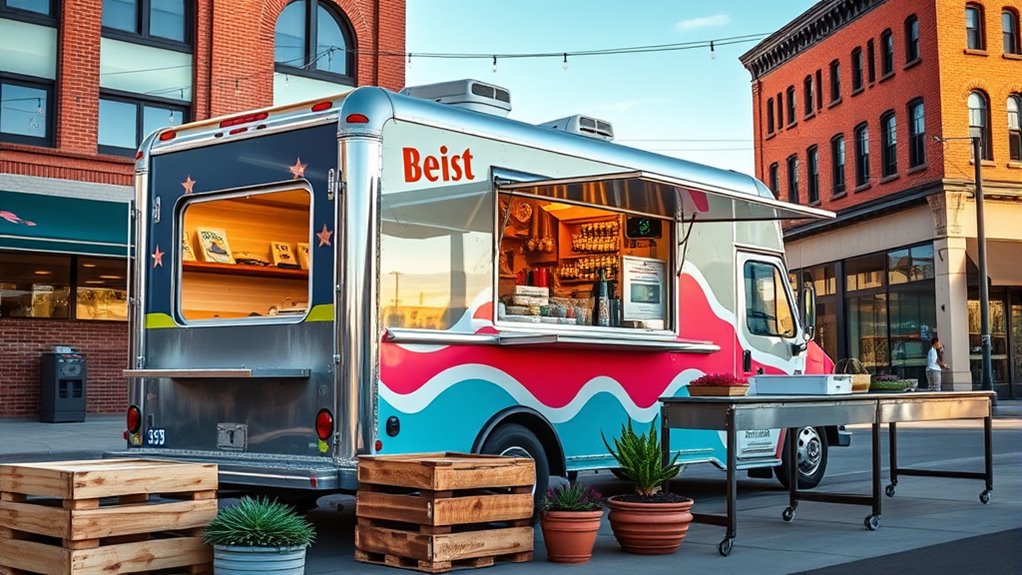
Choosing the right shared kitchen licensing options can save you time and meet local regulations. Next, selecting custom kitchen equipment ensures your truck is tailored to your menu and workflow. These decisions are vital for creating an efficient and compliant base of operations in Boise. Additionally, understanding the necessary regulations for a farmhouse bedroom can help streamline your setup process and ensure compliance with local codes.
Shared Kitchen Licensing Options
Setting up a shared kitchen is a practical way to get your food truck business off the ground without the hefty costs of a dedicated space. Boise offers several licensing options for shared kitchens, making it easier for you to comply with health and safety regulations. These facilities often hold all necessary permits, simplifying your licensing process. You’ll need to verify that the shared kitchen meets Idaho’s food service standards and that it’s approved for mobile food operations. Using a licensed shared kitchen can also reduce your initial investment, as you won’t need to build your own commissary. Always check with local health departments to ensure the shared kitchen you choose aligns with Idaho licensing requirements, giving you peace of mind as you start your food truck journey.
Custom Kitchen Equipment Selection
Selecting the right kitchen equipment is crucial for creating an efficient and functional food truck. Your equipment selection directly impacts your workflow and food quality. Opt for custom kitchen equipment tailored to your menu to maximize space and efficiency. Think about essential items like grills, fryers, and refrigeration units that suit your needs. Here’s a quick guide:
| Equipment Type | Purpose | Key Features |
|---|---|---|
| Commercial Grill | Cook burgers, sandwiches | Compact, high heat, durable |
| Deep Fryer | Prepare fried foods | Easy cleaning, safety features |
| Refrigeration Units | Store perishables | Space-saving, energy-efficient |
Choosing wisely ensures smooth operations and quality dishes, helping your Boise food truck stand out.
Budgeting and Financing Your Food Truck
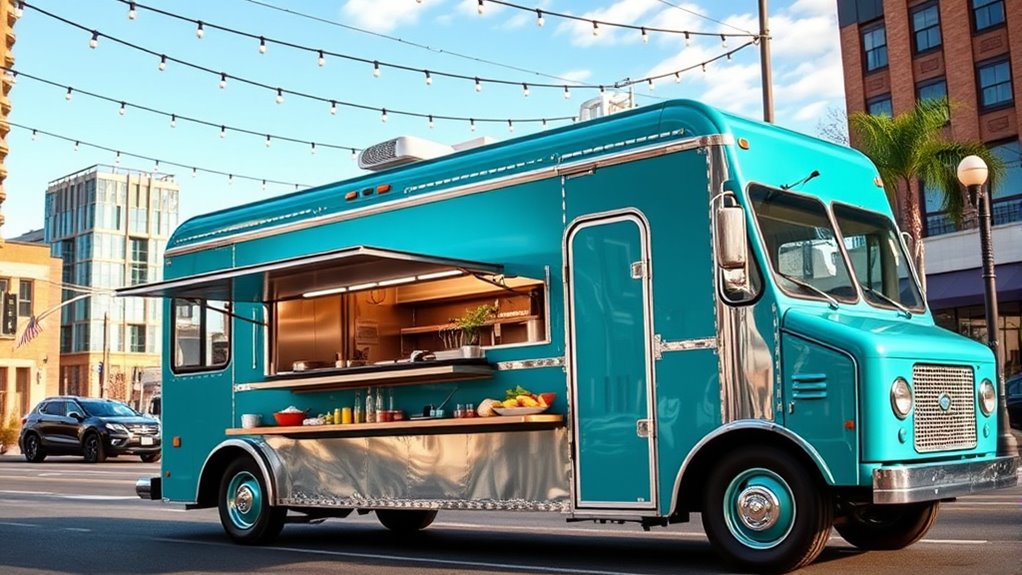
To get your food truck rolling, you need to budget for vehicle modifications, branding, and other startup costs. You’ll also want to understand bank loan requirements and the financing process to secure funding. Don’t forget to account for liability coverage and necessary filings to protect your business and stay compliant. Additionally, understanding efficient general ledger coding can help you manage your finances more accurately from the start.
Initial Vehicle Modifications and Branding
Budgeting and financing your food truck are crucial steps that can determine your project’s success from the start. When planning initial vehicle modifications, focus on essential upgrades to maximize functionality. Proper vehicle branding, including eye-catching logo design, boosts visibility and attracts customers. Keep in mind that investing wisely in branding can generate long-term returns.
| Modification Type | Estimated Cost |
|---|---|
| Wrap & Vehicle Branding | $2,000 – $4,000 |
| Engine & Mechanical Upgrades | $3,000 – $6,000 |
| Kitchen Equipment | $10,000 – $20,000 |
| Interior Customization | $4,000 – $8,000 |
| Safety & Permits | $1,000 – $3,000 |
Prioritize cost-effective modifications that align with your branding goals, ensuring your food truck stands out in Boise’s competitive scene.
Bank Loan Requirements and Process
Securing a bank loan for your food truck requires understanding specific requirements and maneuvering a straightforward process. To increase your chances, prepare a solid loan application that highlights your business plan, revenue projections, and repayment strategy. Banks will also evaluate your credit requirements, so make certain your credit score is in good standing before applying. Keep in mind, lenders typically look for:
- A clear demonstration of your cash flow ability
- Collateral to secure the loan
- Personal and business credit histories
- A detailed budget outlining startup costs
Being organized and transparent during the application process helps you meet bank expectations and expedites approval. By understanding these essentials, you’ll set a strong foundation for financing your Boise food truck successfully.
Liability Coverage and Filings
Since liability coverage is a crucial part of financing your food truck, understanding the necessary filings and insurance requirements can help you avoid unexpected costs and delays. You’ll need to obtain appropriate insurance policies that meet Idaho’s requirements and protect your business. Make sure your policies specify liability limits that cover potential accidents, injuries, or property damage. These liability limits should be sufficient to shield your assets and comply with local laws. Filing proof of insurance with city and state authorities is essential before launching. Keep in mind, failure to meet liability coverage requirements can lead to delays or legal issues. Carefully review your insurance policies to ensure they provide extensive coverage and meet all regulatory standards for operating a food truck in Boise.
Designing Your Menu and Pricing Strategy
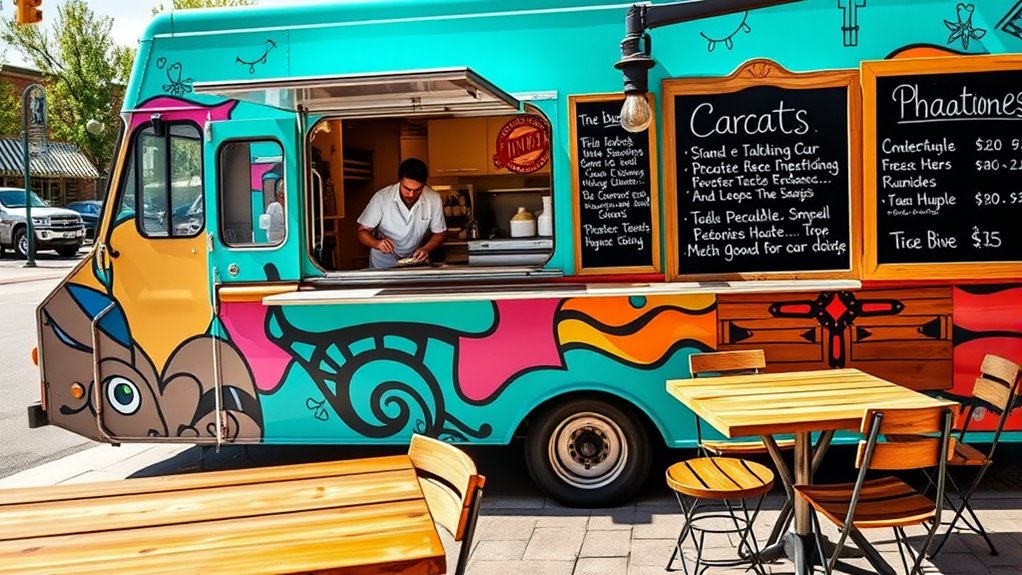
When designing your menu, focus on creating locally inspired signature dishes that resonate with Boise’s community. Make sure to calculate the cost per serving carefully to set prices that cover expenses and attract customers. This approach helps you develop a menu that’s both unique and profitable. Incorporating cost-effective security measures can also protect your business data from cyber threats, ensuring smooth operations.
Locally Inspired Signature Dishes
Creating locally inspired signature dishes allows you to showcase Boise’s unique flavors and culture, making your menu stand out. These signature dishes serve as a reflection of the city’s culinary innovation and local ingredients, giving customers a memorable experience. To develop these dishes, consider incorporating regional ingredients like potatoes, huckleberries, or local cheeses. Focus on flavors that tell a story about Boise’s heritage and landscape. Remember, the goal is to craft culinary creations that are both authentic and innovative, setting your food truck apart.
- Highlight local traditions while adding your unique twist
- Experiment with fresh, regional ingredients for authenticity
- Balance familiar flavors with creative culinary innovation
- Use signature dishes to create a strong brand identity
Cost per Serving Calculation
Understanding your cost per serving is essential for designing a profitable menu and setting the right prices for your Boise food truck. To do this, you need to perform a thorough cost analysis that includes ingredients, labor, packaging, and overhead. Once you know your total costs, divide by the number of servings to determine your cost per serving. This figure helps you develop effective pricing strategies that ensure profitability while remaining competitive. Accurately calculating your cost per serving allows you to identify high-cost items and adjust recipes or prices accordingly. It also provides a clear foundation for menu design, helping you focus on dishes that maximize profit margins. Regularly reviewing your cost analysis keeps your pricing strategies aligned with changing costs and market conditions.
Technology and Operations
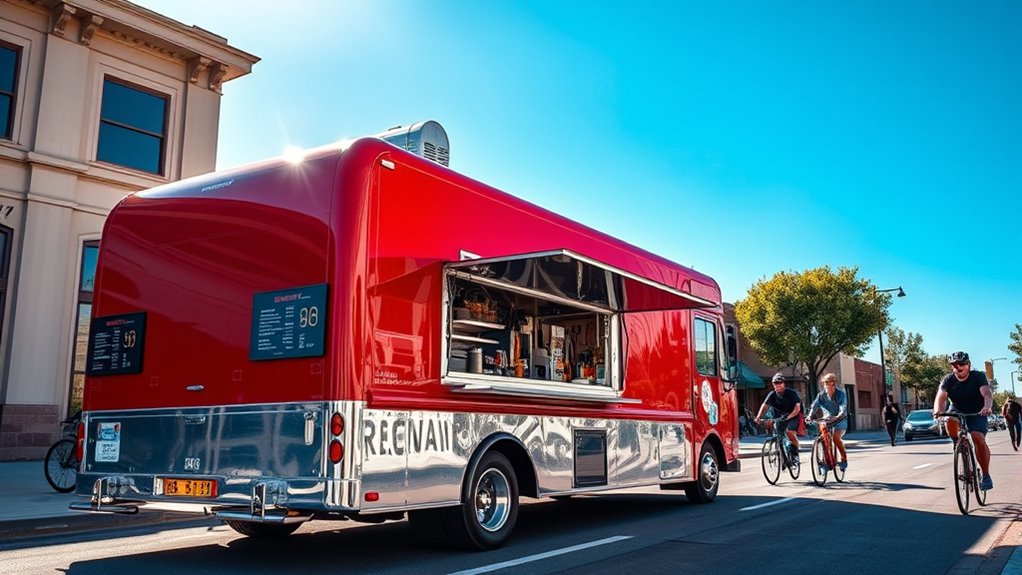
You can make sales faster and safer by offering contactless payment options like mobile payments and card readers. Using a mobile POS system helps you track sales and manage inventory on the go. These tech tools streamline your operations, so you can focus on serving your customers efficiently.
Contactless Payment Options Available
To keep transactions quick and safe, the food truck in Boise offers a variety of contactless payment options. Using contactless payments not only speeds up the checkout process but also enhances digital transaction security, protecting both you and your customers. You can accept payments via mobile wallets like Apple Pay, Google Pay, or Samsung Pay, reducing handling cash and minimizing contact. These options are convenient for customers who prefer quick, hygienic transactions. Implementing contactless payments signals professionalism and modernity, attracting tech-savvy diners. It also helps streamline your operations during busy times. By embracing these payment methods, you guarantee a smoother, safer experience that builds trust and loyalty among your patrons.
- Faster checkouts with minimal contact
- Enhanced digital transaction security
- Increased customer convenience
- Modernizes your food truck operation
Mobile POS and Stock Tracking
Implementing a mobile POS system and stock tracking technology can substantially improve your food truck’s efficiency and accuracy. A mobile POS allows you to process payments quickly, reducing wait times and streamlining transactions. It also helps you manage orders more effectively, minimizing errors. Stock tracking tools enable you to monitor inventory levels in real-time, so you know exactly when to restock ingredients and supplies. This reduces waste and prevents shortages during busy hours. With integrated mobile POS and stock tracking, you gain better control over your operations, saving time and money. Plus, these technologies help you analyze sales data, identify popular items, and optimize your menu. Overall, adopting these systems makes your food truck more organized, responsive, and profitable.
Marketing and Growing Your Presence
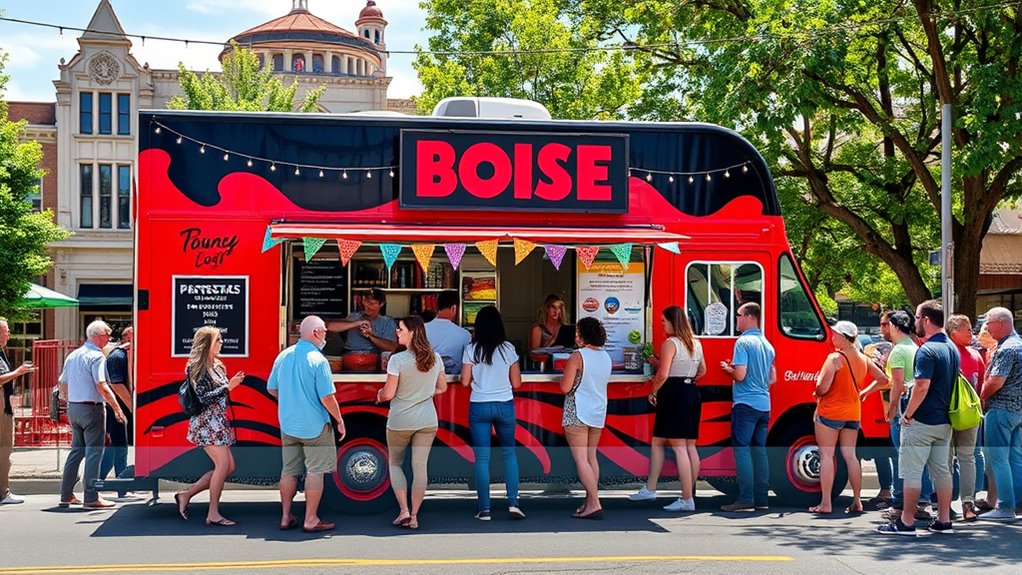
To grow your food truck’s presence in Boise, you should tap into popular local event schedules to boost visibility. Connecting with local food bloggers can also help spread the word and attract new customers. These strategies make it easier to build a loyal following and increase your sales.
Popular Local Event Schedules
Knowing when and where to showcase your food truck can substantially boost your visibility and customer base. By aligning with popular local event schedules, you maximize exposure and attract new customers. Monitor Boise’s community calendars for festivals, farmers markets, and outdoor concerts. These events often draw large crowds, providing prime opportunities for food truck safety and efficient service. Use social media promotion to announce your participation, creating buzz beforehand. Consider the timing carefully; arriving early ensures a good spot and avoids last-minute congestion. Participating in recurring events builds recognition within the community. Keep your schedule flexible to adapt to seasonal festivals or special celebrations. Engaging consistently at these events helps grow your presence and sustains long-term success.
- Maximize visibility during high-traffic events
- Coordinate with event organizers for ideal placement
- Use social media to generate anticipation
- Prioritize food truck safety during busy times
Engaging Local Food Bloggers
Engaging local food bloggers can considerably boost your food truck’s visibility and attract a dedicated audience. Reach out to bloggers who cover Boise’s vibrant food scene and propose collaborations. Attend local food festivals, where bloggers are often present, to introduce yourself and build relationships. Offer free samples or exclusive menu previews in exchange for honest reviews and social media coverage. Blogger collaborations can include hosting special events or joint promotions, helping you reach their followers directly. Consistent engagement with these influencers not only amplifies your presence but also establishes credibility within Boise’s food community. By leveraging these relationships, you position your food truck as a must-visit spot, drawing in more customers and expanding your reach organically.
Boise Food Truck Community Support
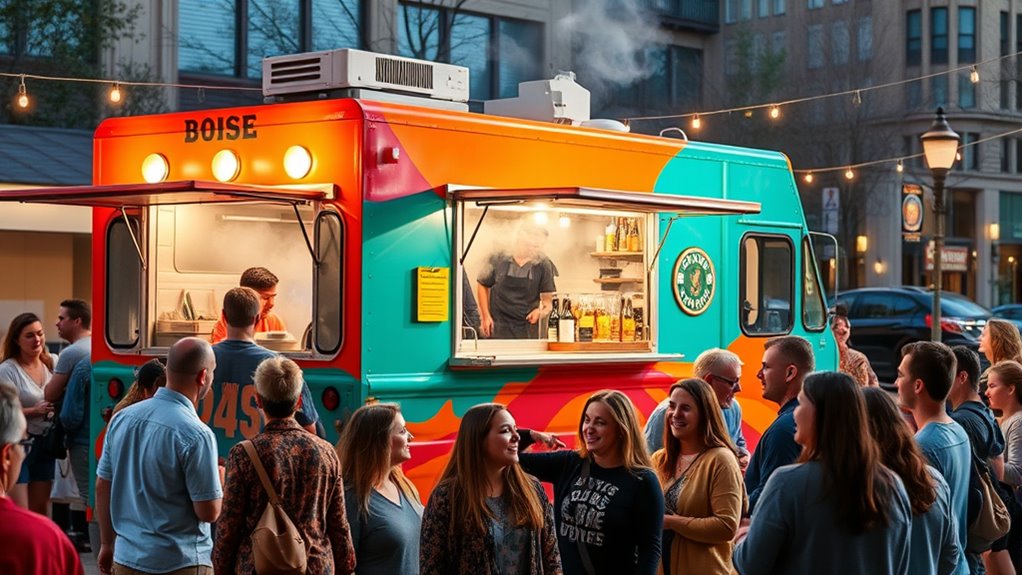
Ever wondered how Boise’s vibrant food truck scene thrives? It’s because of strong community support that keeps things lively. Local events like food truck festivals and community food events draw crowds and foster connections among vendors and residents. The community actively promotes these gatherings, helping food trucks gain visibility and loyalty. You’ll find that participating in or supporting these events boosts your reputation and builds relationships. Boise’s residents value local food trucks, often attending festivals and spreading the word. This support creates a positive feedback loop, encouraging more trucks to start and thrive. By engaging with the community through these gatherings, you’ll find it easier to establish your brand and develop a dedicated customer base. In Boise, community support truly fuels the food truck movement.
Frequently Asked Questions
What Permits Are Required for Food Truck Parking in Boise?
You need to obtain a parking permit from Boise’s city government to park your food truck legally. Check parking regulations for specific zones, as some areas allow street vending while others don’t. Permit fees vary based on location and duration. Make sure to apply in advance, comply with local parking rules, and pay the required fees to avoid fines or penalties for unauthorized parking.
How Do I Find Reliable Suppliers for Local Ingredients?
You stumble upon a community event where local farmers showcase fresh produce, revealing trusted sources for ingredient sourcing. To find reliable suppliers for local ingredients, visit farmers’ markets, join local food networks, and connect with agricultural cooperatives in Boise. These steps help you build relationships with farmers who prioritize quality and sustainability, ensuring your menu highlights fresh, local flavors while supporting your community’s economy.
What Are Common Challenges Faced by New Boise Food Truck Owners?
As a new Boise food truck owner, you’ll face challenges like setting competitive menu pricing and maintaining customer engagement. Balancing food costs with affordable prices can be tricky, and attracting repeat customers requires consistent quality and active social media presence. You might also struggle with local regulations and finding prime locations. Staying adaptable and focusing on excellent service helps you overcome these hurdles, building a loyal customer base and a successful business.
How Can I Effectively Manage Food Truck Inventory?
To effectively manage your food truck inventory, you should focus on accurate inventory tracking to monitor stock levels in real-time. Regularly review sales data to identify fast-moving items and plan stock replenishment accordingly, avoiding shortages or excesses. Use digital tools or apps designed for inventory management to streamline this process, and set up a schedule for periodic audits. Staying organized guarantees smooth operations and maximizes profitability on the go.
Are There Any Food Truck Festivals or Events in Boise?
You’ll be enthusiastic to know that Boise hosts several food truck festivals and Boise food events where you can showcase your truck. These events often happen during summer and fall, providing great opportunities to connect with a broader audience. Keep an eye on local event calendars or social media pages, as participating in food truck festivals can boost your visibility and attract loyal customers eager to try your offerings.
Conclusion
Starting a food truck in Boise is your ticket to joining a vibrant community, fueled by fresh local ingredients and passionate support. Embrace the journey, from understanding local rules to crafting a menu that delights. With smart planning and a touch of creativity, you’ll turn your dream into reality. Remember, success isn’t just about food—it’s about the connections you make. So, take that leap—your Boise food truck adventure awaits, ready to roll!
